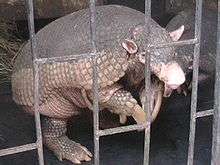Tolypeutinae
Tolypeutinae is a subfamily of armadillos in the family Chlamyphoridae, consisting of the giant, three-banded and naked-tailed armadillos.[2][3][4]
| Tolypeutinae[1] Temporal range: Late Oligocene to present | |
|---|---|
 | |
| Captive giant armadillo in Colombia | |
| Scientific classification | |
| Kingdom: | Animalia |
| Phylum: | Chordata |
| Class: | Mammalia |
| Order: | Cingulata |
| Family: | Chlamyphoridae |
| Subfamily: | Tolypeutinae |
| Genera | |
| |
Phylogeny
Tolypeutinae is the sister group of Chlamyphorinae, the fairy armadillos, as shown below.
| Cladogram[4][7][3] | |||||||||||||||||||||||||||||||||||||||||||||||||||||||||||||||||||||||||||||||||||||||||||||
|
gollark: I'm considering some sort of cryptographic signing scheme for system code and stuff so it can skip safety checks on those.
gollark: It checks code *when it's run*.
gollark: Not files, no.
gollark: Anyway, I'll have you one by then, unless I don't.
gollark: `units` says it is 6.5743596 hours.
References
- Gardner, A. (2005). Wilson, D.E.; Reeder, D.M. (eds.). Mammal Species of the World: A Taxonomic and Geographic Reference (3rd ed.). Johns Hopkins University Press. pp. 94–95. ISBN 978-0-8018-8221-0. OCLC 62265494.
- Moller-Krull, M.; Delsuc, F.; Churakov, G.; Marker, C.; Superina, M.; Brosius, J.; Douzery, E. J. P.; Schmitz, J. (November 2007). "Retroposed Elements and Their Flanking Regions Resolve the Evolutionary History of Xenarthran Mammals (Armadillos, Anteaters, and Sloths)". Mol. Biol. Evol. 24 (11): 2573–2582. doi:10.1093/molbev/msm201. PMID 17884827.
- Gibb, G. C.; Condamine, F. L.; Kuch, M.; Enk, J.; Moraes-Barros, N.; Superina, M.; Poinar, H. N.; Delsuc, F. (2015-11-09). "Shotgun Mitogenomics Provides a Reference Phylogenetic Framework and Timescale for Living Xenarthrans". Molecular Biology and Evolution. 33 (3): 621–642. doi:10.1093/molbev/msv250. PMC 4760074. PMID 26556496.
- Delsuc, F.; Gibb, G. C.; Kuch, M.; Billet, G.; Hautier, L.; Southon, J.; Rouillard, J.-M.; Fernicola, J. C.; Vizcaíno, S. F.; MacPhee, R. D. E.; Poinar, H. N. (2016-02-22). "The phylogenetic affinities of the extinct glyptodonts". Current Biology. 26 (4): R155–R156. doi:10.1016/j.cub.2016.01.039. PMID 26906483.
- "Tolypeutinae". Integrated Taxonomic Information System. Retrieved 18 March 2011.
- Guillaume Billet, Lionel Hautier, Christian de Muizon and Xavier Valentin (2011). "Oldest cingulate skulls provide congruence between morphological and molecular scenarios of armadillo evolution". Proceedings of the Royal Society. 278 (1719): 2791–2797. doi:10.1098/rspb.2010.2443. PMC 3145180. PMID 21288952.CS1 maint: multiple names: authors list (link)
- Upham, Nathan S.; Esselstyn, Jacob A.; Jetz, Walter (2019). "Inferring the mammal tree: Species-level sets of phylogenies for questions in ecology, evolution and conservation". PLoS Biol. 17 (12). doi:10.1371/journal.pbio.3000494.
This article is issued from Wikipedia. The text is licensed under Creative Commons - Attribution - Sharealike. Additional terms may apply for the media files.